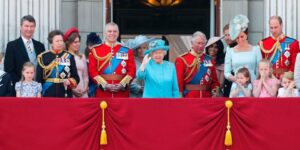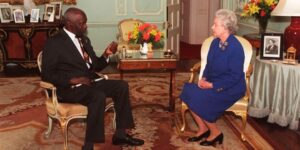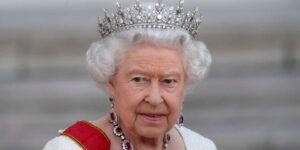The British monarchy and why Kenya’s Lake Victoria is named after former queen.
You will find the question at any place where younger Kenyans interact: “Who is this Queen Elizabeth II? Why is everyone talking about her?”
For instance on Twitter, there were many curious and unpretentious queries being posted yesterday in regard to the monarch who died on Thursday. We tackle some of those.
Why the fuss about a queen who died miles away?
Not all territories have one person being the head of state and also head of the government like in Kenya. It happens so because Kenya is a republic, not a monarchy.
The United Kingdom, a constitutional monarchy, has a king or queen as head of state and Prime Minister as head of government.

The king does not vie for office. He is supposed to remain politically neutral and work with a prime minister from whichever party. But, by tradition, a new prime minister can’t take over before meeting the king or queen.
“By convention, the queen does not vote or stand for election. However, Her Majesty does have important ceremonial and formal roles in relation to the government of the UK,” says an article on www.royal.uk <http://www.royal.uk> , the website of the British Royal Family.
But between 1920 and 1963, Kenya was under the British Empire. Over that time, its head of state sat on the throne left by Queen Elizabeth II on Thursday and now occupied by King Charles III.
Kenya officially became a republic in December 1964 when Jomo Kenyatta transitioned from prime minister to president.
Long before 1920 when Kenya was declared a colony, British occupation had begun from as far back as 1888 after Africa partitioned among European powers following the Berlin Conference of 1884.
British exploration, occupation and later colonialism of Kenya explain the names of things in Kenya that took after the monarchs. Lake Victoria, for instance, was “discovered” in 1858 by British explorer John Speke and named after Queen Victoria who was on the throne then. Until a few years ago, Queen Victoria’s statue stood on one corner of Jevanjee Gardens in Nairobi.
Another example is Kenyatta National Hospital, which was named King George VI Hospital from 1952. This is the year King George VI – the father of Queen Elizabeth II – died. The hospital held the name until 1963 when Kenya attained independence. The disused water fountain next to the Intercontinental Hotel roundabout on your way to Parliament buildings was also made in honour of King George VI.
However, some former British colonies still recognise king or queen as their head of state. They are currently 15, including Canada, Jamaica, New Zealand, and Solomon Islands.
How come Queen Elizabeth II got a successor so quickly?
Through tradition, it is known who will succeed the king or queen if he or she dies or leaves office.
“The basis for the succession was determined in the constitutional developments of the 17th century, which culminated in the Bill of Rights (1689) and the Act of Settlement (1701),” says the royal website.
On the monarchy’s website, a list of up to the 23rd in line to succeed King Charles who took over on Thursday is provided. In case King Charles (73) leaves office today, his son Prince William (40), the Duke of Cornwall and Cambridge, will take over. He is currently designated as the heir-apparent. After Prince William is his son Prince George (9) then his sister, Princess Charlotte (7).

Where does Meghan Markle fall into this?
Meghan Markle might be more famous than Queen Elizabeth II in some circles. In 2018, American actress who had a role in legal drama Suits married to Prince Harry, a brother of the heir-apparent and the sixth in line to becoming king. The marriage made her the Duchess of Sussex. But Prince Harry may hardly be considered for the throne because in 2020, the two stepped down as senior members of the royal family. Prince Harry and Prince William are sons of Princess Diana who died in a road crash in August 1997. Princess Diana had divorced Prince Charles a year earlier.
What is this Commonwealth that people keep associating with Britain?
Despite Kenya breaking away from the monarchy, it is part of the Commonwealth, an association of 56 countries mainly comprising former territories under the British Empire.
“The Commonwealth’s roots go back to the British Empire. But today any country can join the modern Commonwealth. The last two countries to join the Commonwealth were Gabon and Togo in 2022,” says an article on the Commonwealth secretariat’s website.
The UK king or queen is the head of the Commonwealth. One of the most visible activities of the association are the Commonwealth Games that happen every four years. They were first held in 1930.
Is the influence of the monarchy still felt in Kenya?
One of the visible attributes of the monarchy is the Anglican Church or the Church of England, which is the primary State church in England.
The royal family’s website says: “The (king or queen) holds the title ‘Defender of the Faith and Supreme Governor of the Church of England’. These titles date back to the reign of King Henry VIII, who was initially granted the title ‘Defender of the Faith’ in 1521 by Pope Leo X.”
It adds: “On the advice of the prime minister, the (king or queen) appoints archbishops, bishops and deans of the Church of England, who then swear an oath of allegiance and pay homage to His/ Her Majesty. Church of England deacons and parish priests also swear an oath of allegiance to the sovereign.”

As such, the leadership of the Anglican Church is influenced by the monarchy.
Also, one of the most acclaimed versions of the Bible, the King James Bible, is a product of a man who once sat on the throne now held by King Charles III. It was commissioned in 1604 and published in 1611.
“It is supreme in its fluency, first of all. Secondly, we just have to praise the King James Bible for its language and style. It’s not easy to find the adjectives to describe it, but it’s elegant,” said English professor Leland Ryken in a 2011 interview with baptistpress.com.
As such, Christians are among the people with the closest communion to the British monarchy.
The throne has in the past honoured a number of Kenyans for playing various roles, among them their involvement with the St John’s Ambulance. The latest such honours came in March this year when 30 Kenyans affiliated with St John’s Ambulance were honoured for their service to humanity.
Credit: Source link